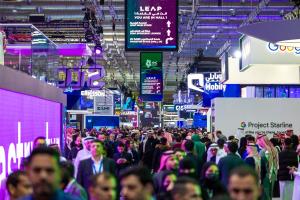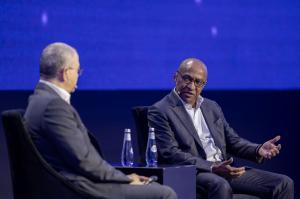
LEAP 2025 Closes with Record US$820 Million Economic Impact for Riyadh and Saudi Arabia
At the end of day four, Michael Champion, CEO of Tahaluf, took to the LEAP 2025 main stage at Riyadh Exhibition and Convention Centre, Malham, to reveal this year’s edition – which was attended by 200,000 industry professionals – shattered a number of records. Champion announced the economic impact of this week’s show, on Riyadh and Saudi Arabia, will be a mammoth US$820 million.
Champion insisted there is more to come, stating the event and the robust partnership with the Ministry of Communication and Information Technology (MCIT) and SAFCSP will continue taking giant strides forward, as he announced a US$80m tenancy agreement to continue bringing Tahaluf mega-events, such as LEAP; world-renowned real estate expo Cityscape Global; CPHI, the Middle East’s leading pharma event; and global fintech platform Money20/20, to Malham for the next four years.
Champion said: “As we close the curtain on another incredible edition of LEAP, the realisation of how impactful these events are to the Kingdom is truly eye-opening. Through our events since 2022 we have realised an economic impact of US$10 billion to the Saudi economy, with this set to reach US$20 billion by 2027.
“We have also committed to a US$80 million tenancy here in Malham over a four-year term that will allow us, along with our partners SELA, to keep improving this venue and make it a truly world-class experience for the millions of visitors we will be attracting across our events in the lifespan of the agreement.”
Annabelle Mander, Executive Vice President of Tahaluf, joined Champion on stage to announce the organisers had delivered on their promise of delivering quality, revealing LEAP 2025 had welcomed 825 first-time exhibitors and more than 1,900 investors – 74 per cent of whom travelled to Riyadh from overseas – with a combined US$22 trillion in Assets Under Management (AUM), representing a 400 percent year-on-year increase.
“The robust increase in our international market presence year-on-year, further cements LEAP’s status as a deal-making hub,” said Mander. “We have also exceeded all previous editions on confirmed and committed onsite investments, with this year totalling over US$15 billion across AI, data centre expansions, and smart energy sector growth. I would like to thank all our partners who put their trust in us and see the incredible benefits LEAP offers as a platform to announce such critical regional and international partnerships.”
AI is an Ecosystem That is Redefining Government and Industries and Leadership, says PwC Chairman
Artificial Intelligence is an ecosystem redefining everything from government administration and industries, to business leadership and everyday innovation. So it is imperative people are educated not to fear it, but rather trust its potential, according to Mohamed Kande, global chairman of PwC, one of the world’s largest professional services companies.
Talking on the LEAP 2025 main stage on the final day of an action-packed four-day event, Kande outlined how emerging technologies, including AI, are redefining industries. He cited the example of technology’s convergence with healthcare, referring to a smart ring on his finger which captures personal health data.
“We are finding that participants in industries are very different to what they used to be,” said Kande.
“Technology companies are now involved in many different industries. Take the example of how we feed ourselves. In agribusiness, we now have technology businesses heavily invested. What technology has done is to converge industries. The competition now, looking at where they can add value, is very different to what it used to be. Technology is reshaping how businesses and governments are providing their services.”
Elaborating on the construct that AI “is a convergence of the physical and digital”, the PwC boss used the example of physical data centres, which house digital technology, yet one of the major things needed to allow data centres to work is cooling equipment, which is physical.
“AI really is an ecosystem,” he said. “You have digital and physical coming together to deliver the intelligence. No country has the capability to deliver all components of the AI ecosystem, and that is a big goal for Saudi Arabia.
He then told attendees that one of the biggest barriers to realising the true benefits of AI is human distrust: “Trust is the commodity of business. Without it, consumers do not purchase the products, and it’s the same with AI. People still fear artificial intelligence. People fear what they don’t understand. You have to help people understand, so they can trust us. AI is not going to replace humans; we have to show them what they can use it for. Transparency is key.”
Asked for his advice on how business leaders should be approaching AI adoption, Kande added: “We have all been trained to run businesses in a certain way – better, faster, cheaper. Now we have to do things differently. It’s no longer a game where we have to provide the answers, it’s a game of experimentation. You cannot delegate learning. It’s no longer a game of faster, better, cheaper, it’s a game of choices. You might make mistakes, but we need different leadership skills.”
Meanwhile, Jerry Inzerillo, Group CEO, Diriyah Gate, told delegates how his team are using technology to make the 14 million square-metre development run and “make life better than it was the day before”.
Insisting there are often “too many buzzwords” when it comes to technology, the hospitality and tourism leader told the audience how, through partnerships with companies such as STC, Diriyah Gate is implementing smart cities technology to enhance sustainability, livability, walkability, and improve quality of life for its residents, visitors, and wildlife, adding how the planting and caring of millions of trees has resulted in the influx of bird species.
Diriyah is, he said, “a cultural hub above, and a smart city below”. He added: “When you look after a project the size of Geneva, you have to be efficient and we are very fortunate to have a team of people who make our technology systems talk to one another.”
Moneyball 2.0: The Next Era of Sports Investments
As the global sports industry continues to grow exponentially, investors are playing a pivotal role in shaping its future, according to a leading global sports investor. Speaking at the Sports Tech Arena, Finn Hatherell, Venture Partner at BVP, discussed opportunities in sports investments, from venture capital in emerging sports tech to strategic investments in leagues, teams, and esports.
“One thing to be aware of in the sector is that sport is a highly cyclical and ever-changing industry, and, from what I've seen with early-stage sports tech companies, selling to elite organisations is not that straightforward,” he said. “I had one company recently, which, for about two years, was piloting its technology at Liverpool Football Club. It was an AI software that helped athletes optimise their training and prevent injuries by showing them how to do exercises and training efficiently.
“After two years, it got to the stage where the club wanted to onboard the tech full-time. I don't know if anybody remembers what happened last year, but Jurgen Klopp sadly resigned, and with that comes a whole S&C coach, a new head of sports, a new head of training. So suddenly, this football club that you've been working with has changed completely, and you're dealing with new personnel.
“One thing I've noticed about sales cycles in sports tech is that they are highly unpredictable. It can be difficult selling to the world’s top sports clubs as a lot is left to chance, but it also can be highly lucrative at the same time.”
For more information on the event and ticket options, visit onegiantleap.com
Nour Ibrahim
MCS Action FZ LLC
544250187
email us here
Distribution channels: Business & Economy, Companies, Conferences & Trade Fairs, IT Industry, Technology
Legal Disclaimer:
EIN Presswire provides this news content "as is" without warranty of any kind. We do not accept any responsibility or liability for the accuracy, content, images, videos, licenses, completeness, legality, or reliability of the information contained in this article. If you have any complaints or copyright issues related to this article, kindly contact the author above.
Submit your press release



